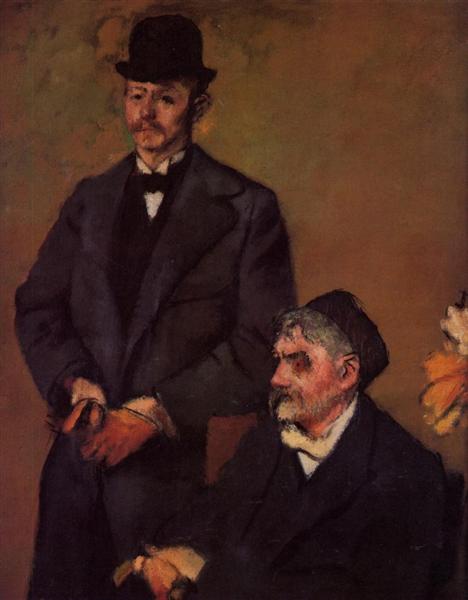Description
Edgar Degas's 1898 painting "Henri Rouart and his Son Alexis" is a testament to the artist's ability to capture intimate moments in everyday life, a recurring theme in his work. Known for his innovative approach and mastery of color and light, Degas presents us with a scene that, while seemingly simple, is imbued with deep emotional charge and thought-provoking delicacy.
The composition of this work is notable for its focus on the figure of Henri Rouart, a close friend of Degas and an art enthusiast, who is shown sitting in a chair, while his son, Alexis, stands beside him. Through this depiction, Degas establishes a palpable connection between the two generations, suggesting not only family intimacy, but also the transmission of knowledge and values. The way the figures are arranged in space is crucial: Rouart is positioned as an anchor in the work, while Alexis, with his inquisitive attitude, seems to be in a learning moment.
Degas once again demonstrates his mastery of colour. The palette he uses is subtle and varied, with velvety tones that provide warmth and a sense of realism. Shadows play a crucial role in the work, adding depth and volume to the figures, and contributing to the enveloping atmosphere of the painting. The luminosity emanating from the figures highlights the importance of the characters, contrasting with the darker tones of the background.
In terms of technique, Degas employs his signature approach to capturing movement and spontaneity, typical of the Impressionists, although his work often transcends this label. In "Henri Rouart and his Son Alexis," one can see the influence of the more formal approach of academic painting, with an attention to detail and proportion that highlights the artist's professionalism. The surface of the painting is treated with brushstrokes that interact and merge, creating an engaging and dynamic visual effect.
In terms of context, it is interesting to note that this work is produced at a time when Degas was withdrawing from Parisian social life, suggesting that his art was nourished by the close, personal relationships he maintained. Although less well-known than his paintings of ballerinas or scenes of urban life, this portrait of Rouart and his son reveals a different side of Degas, one that values the richness of family relationships and shared time.
It was first exhibited at the 8th Exhibition of Independent Artists in Paris, and has remained a touchstone in the artist’s work ever since. Family compositions in art have been a common theme across a number of traditions, but it is the way Degas humanizes and personalizes the viewer’s experience that sets this work apart. The moments of connection between father and son, reflected in Alexis’ subtle gaze and posture, remind us of the universality of such bonds, evoking an almost palpable nostalgia that resonates with the viewer.
In short, “Henri Rouart and his Son Alexis” is an iconic work that encapsulates the essence of Degas’ work, fusing intimacy and technical mastery. This painting not only offers us a glimpse into the relationship between a father and his son, but also opens a window into the artist’s life and sensibility, a reminder that behind every image there is a story that transcends time.
KUADROS ©, a famous painting on your wall.
Hand-made oil painting reproductions, with the quality of professional artists and the distinctive seal of KUADROS ©.
Painting reproduction service with satisfaction guarantee. If you are not completely satisfied with the replica of your painting, we will refund 100% of your money.

